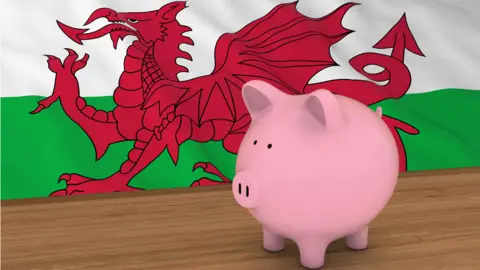Wales budget: More NHS cash but council cuts expected
Health spending will rise by 5%, but core funding for Welsh local councils is likely to be cut again under ministers' new spending plans.
Funding for local government will fall around 2%, despite some extra money for councils to spend on social care.
Outlining his £18bn budget for 2019-20, Finance Secretary Mark Drakeford said there would be no changes to the tax on buying property or income tax.
But private schools and hospitals could face higher business rates.
Thanks to extra funding from Westminster and cash from reserves, the total budget has grown slightly - around 1% above inflation compared to this year.
Nevertheless, Mr Drakeford told AMs that the "dark clouds of Brexit", "unremitting pressure on budgets" and "rising demand for services" made this "the most difficult budget yet".
"With less money, more demand and inflation growing we have worked hard to squeeze every penny we can for those services that matter the most to people," he said.
A full breakdown of the budget, and the impact it will have on services, will not be available until 23 October. On Tuesday Mr Drakeford only released headline figures for each Welsh Government department.
The delay means it is not possible to say how much of the health funding will go directly into the NHS.

The WLGA, which represents Welsh local government, warned that council social care and education services would "increasingly bear the weight of funding reductions".
WLGA finance spokesman Anthony Hunt said: "The challenge facing councils to keep vital local services like schools and social care running cannot be overstated.
"If austerity doesn't end soon, public services as we know them will be a thing of the past."
Around 80% of the Welsh Government's funding comes directly from Westminster in a block grant.
For the first time next year, 12% of the budget will come from income taxes collected in Wales. The rest comes from business rates and other devolved taxes.
A decade of austerity cuts by the UK government mean next year's budget will be 5% lower in real terms than it was 10 years earlier.

Analysis
By BBC Wales political editor Felicity Evans
 Fredex8/Getty Images
Fredex8/Getty ImagesThe budget this year is more generous than last year in real terms.
That is partly because of some extra money from the UK Treasury coming to Wales, and partly because Mr Drakeford chose to deploy some of his reserves.
Health is the big winner, with an increase of more than five per cent, but the question of how much of that will find its way to the NHS is unclear.
While it looks today like core funding for councils has been cut in real terms, there are a variety of grants and another specific spending awards which will provide additional money.
The question of how much they'll get will be clearer next week. As a senior local government source told me: "This is the overture before the opera".

Conservative finance spokesman Nick Ramsay told AMs: "Rather than the usual harsh words about austerity, perhaps you should look a little bit closer to home about what we're doing in Wales to deal with the financial problems that this country was left with by a previous government."
Plaid Cymru Steffan Lewis welcomed the budget announcement, which represents the second year of the party's two-year budget deal with the government.
He said: "The second part of the two-year deal includes new money for national transport infrastructure to improve north-south links and feasibility studies into nation building projects, the details of which will be announced in due course."
UKIP's Neil Hamilton called Mr Drakeford "a safe pair of hands" who "has managed his task with great clarity and ability".
In his budget statement, Mr Drakeford said he would not change the bands and rates of land transaction tax - the successor to stamp duty.
He also confirmed - as expected - that there would no change to income tax.
The Welsh Government will acquire the power to vary income tax next April, but Labour has promised not to make any changes before 2021.
In other tax changes, Mr Drakeford announced a consultation on stopping private schools and hospitals claiming charitable business rate relief.
He will also consult on exempting care leavers from paying council tax until they are 25.
